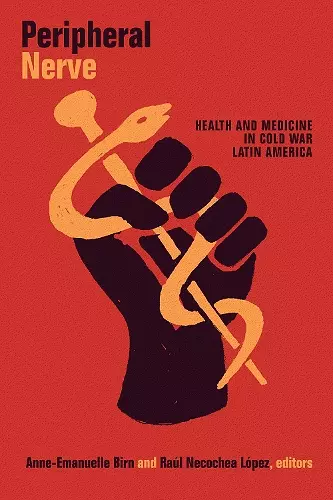Peripheral Nerve
Health and Medicine in Cold War Latin America
Anne-Emanuelle Birn editor Raúl Necochea López editor
Format:Paperback
Publisher:Duke University Press
Published:14th Aug '20
Currently unavailable, and unfortunately no date known when it will be back
This paperback is available in another edition too:
- Hardback£95.00(9781478008682)

Buenos Aires psychoanalysts resisting imperialism. Brazilian parasitologists embracing communism as an antidote to rural misery. Nicaraguan revolutionaries welcoming Cuban health cooperation. Chilean public health reformers gauging domestic approaches against their Soviet and Western counterparts. As explored in Peripheral Nerve, these and accompanying accounts problematize existing understandings of how the Cold War unfolded in Latin America generally and in the health and medical realms more specifically. Bringing together scholars from across the Americas, this volume chronicles the experiences of Latin American physicians, nurses, medical scientists, and reformers who interacted with dominant U.S. and European players and sought alternative channels of health and medical solidarity with the Soviet Union and via South-South cooperation. Throughout, Peripheral Nerve highlights how Latin American health professionals accepted, rejected, and adapted foreign involvement; manipulated the rivalry between the United States and the USSR; and forged local variants that they projected internationally. In so doing, this collection reveals the multivalent nature of Latin American health politics, offering a significant contribution to Cold War history.
Contributors. Cheasty Anderson, Anne-Emanuelle Birn, Katherine E. Bliss, Gilberto Hochman, Jennifer L. Lambe, Nicole Pacino, Carlos Henrique Assunção Paiva, Jadwiga E. Pieper Mooney, Raúl Necochea López, Marco A. Ramos, Gabriela Soto Laveaga
“Peripheral Nerve is a robust and innovative inquiry into the course of the Cold War on the ground through developments in the health and medical professions in Latin America. The essays advance our knowledge and understanding of a fascinating range of case studies, combining well-researched personal stories and local histories articulated within national and international contexts. Every essay is thoroughly researched and excellently written.” -- Daniela Spenser, coeditor of * In from the Cold: Latin America’s New Encounter with the Cold War *
“An impressive collection of novel studies that demonstrates that the Cold War was global and left an enduring legacy. This book problematizes narratives of the U.S. command of Latin American public health and medicine by incorporating not only the role played by the Soviet Union but also the contribution of transnational intermediaries who pitted the superpowers against each other in processes of professional validation, state-building, and South-South solidarity ties.” -- Marcos Cueto, coauthor of * Medicine and Public Health in Latin America: A History *
“Peripheral Nerve advances our understanding of the region's Cold War in many consequential respects. Above all, it challenges the conventional historical narrative that, in health and medicine, as elsewhere, Latin America's Cold War history was circumscribed and constrained by the hegemonic dominance of the United States in its imperial ‘backyard.’ . . . . The book's examination of Latin America's relations with the Second World before, during, and after the Cold War redresses a serious imbalance in the burgeoning literature, while extending the new scholarship’s appreciation of the regional struggle's ‘multivalent, multilevel nature.’” -- Gil Joseph, from the foreword
“...[N]ew research, attuned to the impacts of superpower machinations but insistent on identifying distinctly inter-American dynamics, is gradually remaking popular understandings of the Cold War in Latin America. With varied contributions and scales of analysis, Peripheral Nerve is a strong contribution to this emerging literature.” -- Andre Pagliarini * Cold War History *
“One hopes that as the history of medicine in Africa and Asia during the Cold War more fully develops, Latin Americanists researching transnational medical connections will employ a comparative lens toward other parts of the global South.... Peripheral Nerve has proven that such efforts will engage a multidisciplinary audience of readers.” -- Kelly Urban * Hispanic American Historical Review *
“As Peripheral Nerve shows, the history of health and medicine in Latin America is, excuse the pun, in very good health, and clearly has much to tell us about the region’s experience of the Cold War and its legacies.” -- Paulo Drinot * H-Diplo, H-Net Reviews *
“Peripheral Nerve expertly demonstrates the subjective politics behind the creation of seemingly objective scientific and medical knowledge in twentieth-century Latin America.... The volume could not have come out at a better moment, a true demonstration of its importance to the history and historiography of health and medicine in the Americas.” -- Cassia Roth * Social History of Medicine *
“Irrespective of the coronavirus pandemic, Peripheral Nerve is a smart, timely, and welcome contribution to our understanding of health, medicine, policy, and development in Latin America and beyond. But given the current crisis, this anthology seems particularly apropos.” -- Chris Hartmann * NACLA Report on the Americas *
“Peripheral Nerve is an important contribution to the historiography of the Latin American Cold War.... The book’s theoretical insights and solid empirical research...provide a rich and nuanced analysis of the history of health and medicine in twentieth-century Latin America.” -- Jorge A. Nállim * Social History *
ISBN: 9781478009566
Dimensions: unknown
Weight: 522g
384 pages